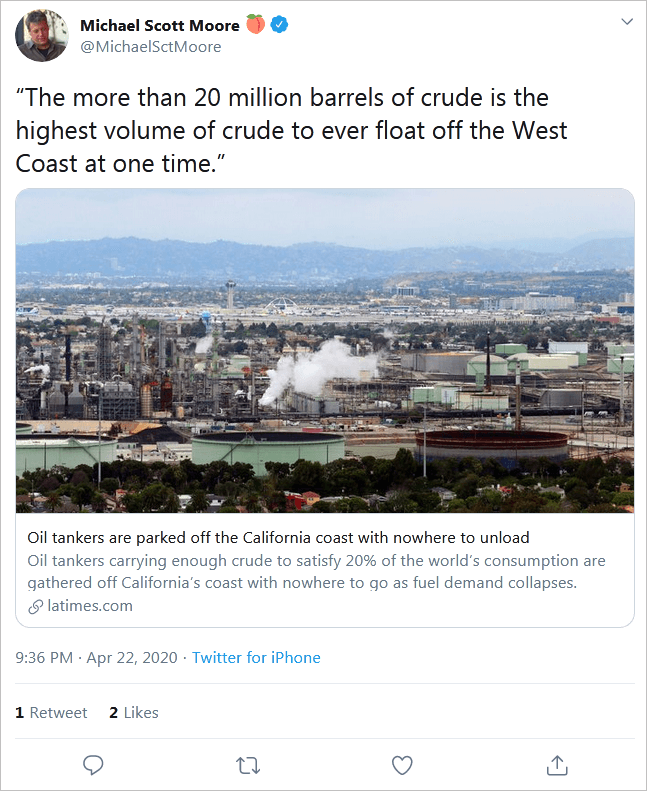Oil Price Could Crash to Negative $100 Next Month. Here are 3 Reasons Why

The crude oil tanker, Chemtrans Cancale, is seen anchored offshore as it waits to dock in Fort Lauderdale, Florida. Oil futures for the first time ever moved below zero as the economic turmoil caused by the coronavirus crisis continues. Here is why the downturn is far from over. | Image: Joe Raedle / Getty Images / AFP
- Oil prices could dive deeper into negative territory next month.
- The global economy will contract this year, further dampening demand.
- Angela Merkel has warned that the novel coronavirus is not going away soon.
Oil prices reached uncharted territory earlier this week by falling to sub-zero levels. With consumption not expected to improve anytime soon, they could still fall even further next month.
Mizuho Bank analyst Paul Sankey says oil prices could plunge by another 150% next month from this week’s low:
Will we hit negative $100 a barrel next month? Quite possibly.
On Monday, U.S. oil reached negative $40.32, the first time the commodity ever traded below zero.

Why a further 150% drop in oil prices is likely
May West Texas Intermediate’s fall into negative territory this week was attributed to traders who didn’t want to take delivery of the commodity. The June contract has avoided negative territory–for now–but the storage problem remains unsolved.
Royal Vopak NV, the world’s largest independent oil storage firm, revealed Tuesday that its capacity to store crude and refined fuels was nearly exhausted .
In California, oil tankers loaded with crude capable of meeting a fifth of global consumption are stranded off the coast with nowhere to unload their cargo .

In India, the world’s third-largest oil consumer after the U.S. and China, storage facilities are threatening to overflow. India boasts a storage capacity of around 85 million barrels.

These scenarios are no doubt unfolding in other parts of the world too. Expect oil prices to continue lower.
The root of the problem remains unresolved
The oil demand destruction is a result of border closures and shelter-in-place orders, which hampered consumption by travel and manufacturing industries. Only a return to normalcy would resuscitate demand. But even the most eager of governments to lift restrictions have admitted this is still a long way off.
German Chancellor Angela Merkel has warned her country, which has handled the pandemic spectacularly well, that the worst is yet to come.
Speaking to the Bundestag, Merkel warned of prolonged hardships :
We’re not living in the final phase of the pandemic, but still at the beginning. We will be living with this virus for a long time.
There is no vaccine or treatment in sight for the coronavirus, which means restrictions on movement and economic activity will remain in place around the world. That’s bearish for oil.
Another bearish signal for oil: Global economic recession
The coronavirus pandemic has decimated economic activity around the world, and the effects are just beginning to be felt. A worldwide economic downturn is now a foregone conclusion.
Switzerland, for instance, is expecting the worst economic contraction since 1975 . A sluggish economic recovery is likely to start in 2021.
Fitch Ratings expects the U.K.’s GDP to contract 6.3% in 2020 , while the E.U.’s GDP will fall by 7%. U.S. GDP is forecast to decline by 5.6%.

There is hope that, just like other economic downturns in the past, this too shall pass. But by the time normalcy returns, crude oil will have endured worse than it did this week.
Disclaimer: The opinions expressed in this article do not necessarily reflect the views of CCN.com. The author holds zero interest in oil and related commodities.